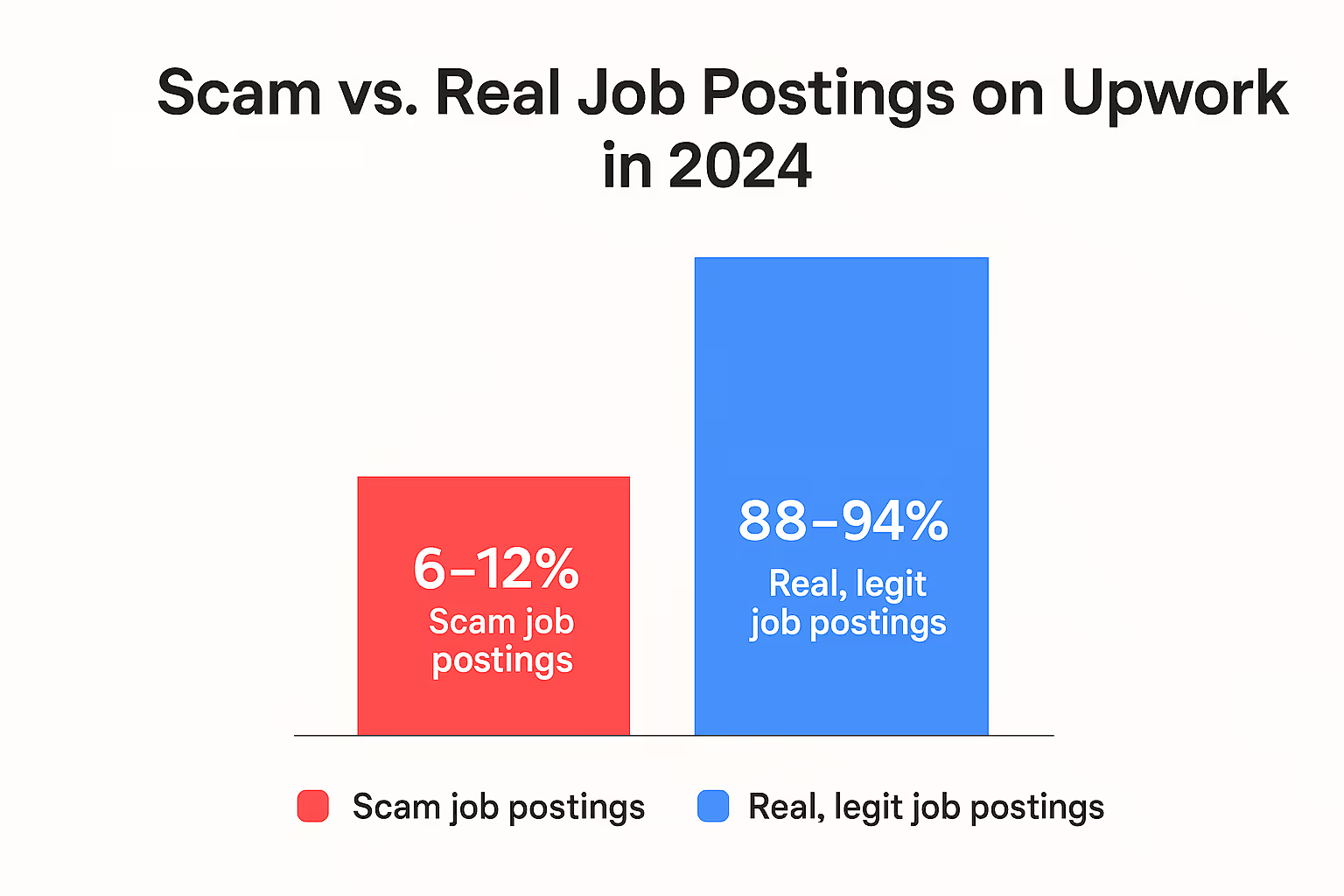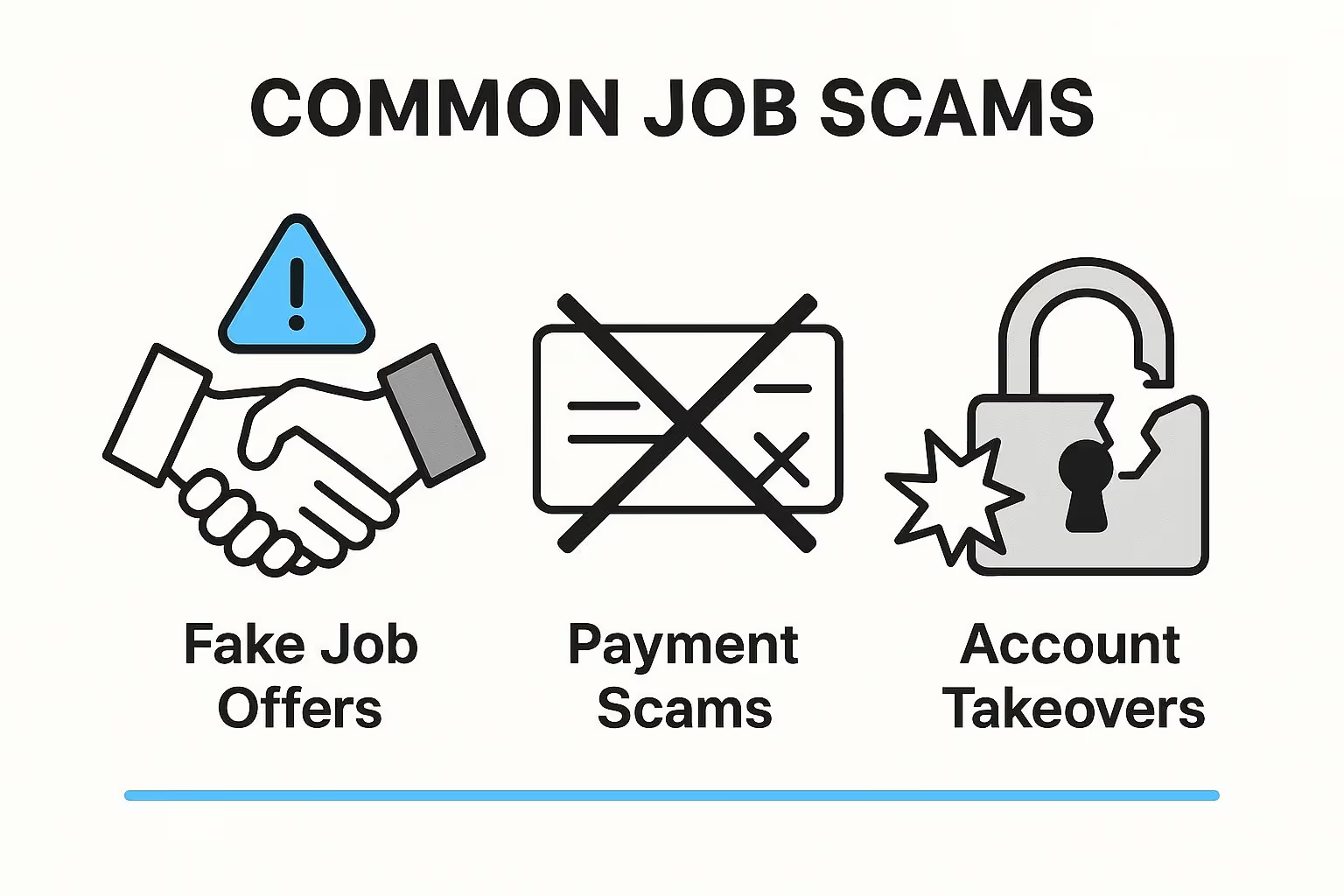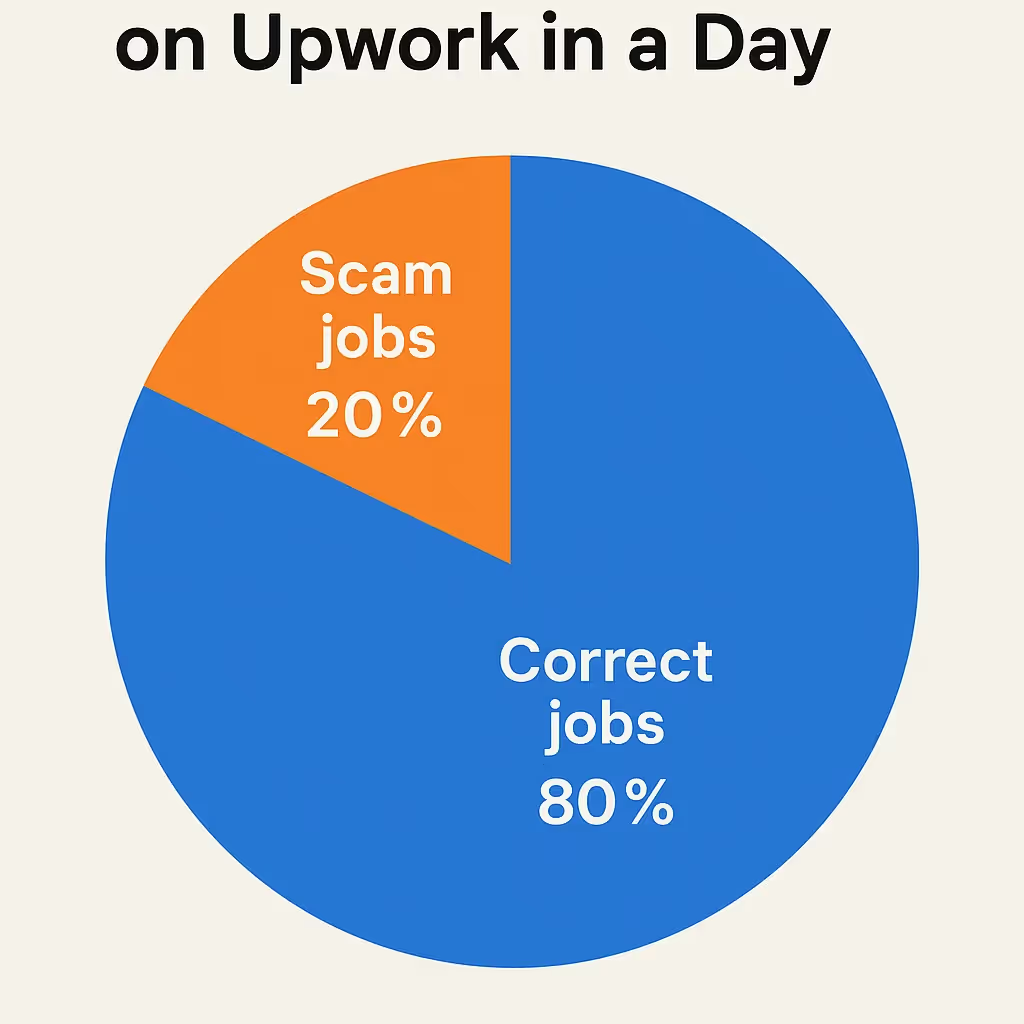"I Just Got Scammed on Upwork - Now What?"
If you've recently been scammed on Upwork, you're likely feeling frustrated and uncertain about what to do next. This article is here to help you navigate these challenges by examining real scams, offering protection strategies, and guiding you on how to recover and move forward.
In this article, we'll break down the common scams to watch out for, provide tips on safeguarding yourself against fraud, and share steps to bounce back after an unfortunate experience. With new measures in place, Upwork is actively working to create a safer environment for freelancers and agencies alike. For instance, over 12,000 scam jobs were removed from Upwork in 2024, making the platform more secure for everyone.
Let's get something straight: Upwork is a platform where you can find great clients and projects. Whether you're an agency looking for large projects, a new freelancer, or a professional aiming to grow, there are plenty of opportunities. However, like any large online marketplace, some people try to post fake jobs on Upwork.
The question isn't "Is Upwork a scam?" and avoiding it completely would mean missing out on many good clients. The key is to learn how to use it wisely, avoid the scams, and find real opportunities.

Is Upwork a Scam or Just Full of Fake Jobs?
Think of Upwork as a bustling place with many opportunities. Freelancers and agencies can discover numerous chances to grow here. But, just like in any busy place, there are those who might try to deceive you. Recognizing that both genuine and fake jobs exist is the first step to success.
The good news is that for every fake job, there are many real, excellent projects. Upwork pays freelancers over $3 billion each year. The problem isn't with Upwork itself; it's with the scammers creating fake jobs to trick inexperienced freelancers.
This is particularly true for agencies not yet on the platform- they're missing out on potential clients. For new agencies, Upwork is an effective way to build a client list from scratch.
Sorting through numerous job posts to find real ones can be time-consuming. Fortunately, Upwork is actively working to remove these fake jobs. For instance, in 2024 and early 2025, Upwork blocked many scam job posts, making it safer for everyone.
With these changes, finding real and rewarding jobs on Upwork is easier, allowing freelancers and agencies to focus on building trustworthy careers.
Types of Scam Jobs on Upwork
Exploring Upwork can be very rewarding, but just like any busy marketplace, there are some people with bad intentions. The upside? Scammers usually stick to the same old tricks.
Once you know how to spot these tricks, recognizing fake jobs on Upwork becomes pretty easy. It's not about being negative; it's about being smart to protect your time and money. Here are some common scams you might find on Upwork.

These scams all aim to get you away from Upwork's safe environment. Knowing the signs is your best protection.
🔍 Real Scam Tactics You’ll See in 2025
It’s not just vague “scam types” - freelancers in 2025 report running into very specific schemes that repeat constantly:
- Fake AI Training Jobs: These scams offer quick jobs where you “train AI” by typing text. They then ask you to pay a fee to unlock access to the tool or dashboard.
- Crypto Payout Gigs: The job sounds normal (e.g. writing or VA), but then the client insists on paying you in crypto and requires you to “verify” your wallet by sending them money first.
- Document Verification Requests: You’re asked to send a photo of your ID or a selfie “for compliance,” but the job never materializes.
- Investment Pitch Scams: The client asks for help creating pitch decks for a fake business idea and includes phishing links disguised as examples or branding.
The moment a client asks for payment, shares suspicious links, or goes off-platform - leave immediately. These tactics are designed to trick new or rushed freelancers who are eager to land work.
Warning Signs in Job Descriptions
Client Actions That Suggest a Scam
This is probably the most common warning sign. A client replies to your proposal and quickly asks to move the chat to an app like Telegram, WhatsApp, or Google Hangouts. Their reason? It's "faster" or "easier." Don't be fooled.
You apply for a data entry job that looks good. Quickly, you get a reply: "You're perfect for this! Let's chat on Telegram, my username is [username]." This is a typical setup for a scam. Once off Upwork, they are out of the platform's control and might disappear after getting free "test" work from you.
Upwork’s messaging system is there to protect both you and the client. Keeping all talks on the platform before starting a contract creates a record. If a client pushes you to chat elsewhere, it's a big warning of a scam. Just say no and move on.
Another common scam is the fake check scam. The scammer hires you, sends a check for more than promised, and asks you to send back the extra money. The check is fake, and by the time it bounces, you've already sent your real money to them.
Smart Steps Before Taking a Job
A real client will never ask you to pay them for a job. Scammers, however, post fake jobs that make you pay for "special training," "required software," or a "refundable deposit." This goes against Upwork's rules and is sure to be a scam. You can find more tips on spotting these tricks in our complete guide on identifying scams on Upwork.
Remember, Upwork is a great place to find clients and exciting projects. It's where companies look for expert help. But to make the most of these chances safely, you need to be informed.
How to Stay Safe on Upwork
Even in 2025, scams on Upwork are still present, just in new ways. While Upwork has enhanced its fraud detection, scammers have also become smarter. So, instead of just being careful, it's important to have a good plan to protect your time, money, and energy.

Always Stick to Upwork
The key rule is simple: keep all chats and payments on Upwork until your contract starts. Upwork’s protections for payments, disputes, and fraud only work if you stay on the platform.
Scammers might ask you to use Telegram for chatting or PayPal for payments. Ignore these requests as they are big warning signs. Leaving Upwork means losing all its protections.
If a client insists on these methods, report the post and move on without needing to explain.
Spot Real Clients
Upwork gives you enough information to find trustworthy clients. Before applying for a job, look at the client’s profile for:
- Verified Payment Method - avoid clients without this.
- Client History - check for completed jobs, positive feedback, and repeat hires.
- Total Spend - serious clients usually spend over $1,000 on the platform.
A new client without verified payment or job history isn’t always a scam, but it’s riskier.
Watch for Language and Format Clues
Scam job posts often have unclear descriptions, high pay offers, or poor grammar. Be careful of phrases like:
- “No experience needed, earn $300/day”
- “Quick hiring, interview on WhatsApp”
- “We’ll send a check first, then you buy software”
These are warning signs because real clients don’t do things this way.
Avoid Suspicious Downloads or Links
Scammers might use phishing or malware disguised as a “brief” or “test task.” Don’t open files or links that seem suspicious, especially from clients who haven’t hired you or verified payment.
If unsure, ask the client to use Upwork’s system to share files, instead of external links like Dropbox or Google Drive.
Use Automation to Filter Jobs
If you’re a busy freelancer or agency, checking each job post can take a lot of time. The more applications you send, the more scams you might see.
Tools like GigRadar can help by setting filters for minimum budget, payment verification, and removing scammy keywords, so only real jobs appear in your feed.
Build a Profile That Discourages Scammers
Scammers often target freelancers who are new or have incomplete profiles. A strong, detailed profile - with clear service offerings, case studies, and a professional bio - can attract serious clients and keep scammers away.
If you’re new, check our guide on [how to get your first job on Upwork] to improve your profile and find real opportunities.
Common Scam Stories on Upwork
.avif)
It's one thing to talk about scams in theory, but it's another to see how they play out. Hearing firsthand stories is the best way to learn what to watch for and protect your own freelance business from Upwork fraud.
A freelancer gets a message about a fantastic project. The client is enthusiastic but has one request: "Could we switch over to Telegram? It's just easier." The freelancer agrees, does the work, and... crickets. The client vanishes. Because the conversation happened off-platform, Upwork can't help. This is a textbook example of Upwork job scams. You can find more deep dives into these sneaky tactics on Hackernoon.
After reading this, it’s easy to think that Upwork is a scam, but that’s just not true. The freelancers who succeed are the ones who know how to navigate the platform safely and efficiently.
Take, for instance, a new design agency I know. They were well aware of the potential for fake jobs on Upwork. Instead of spending hours manually weeding through job posts, they used GigRadar. By setting up smart filters, they tuned out all the noise and only saw jobs from verified clients with a proven payment history. Within their first week, they landed three amazing jobs from established businesses, showing that a successful start on Upwork isn't about luck; it's about having the right process.
What to Do If You Get Scammed on Upwork
Getting scammed is tough, but it's not the end. The key is to act quickly, keep records, and secure your account and future work.
🛑 Step 1: Stop All Communication
If something feels wrong, stop talking to them immediately. Don't share any more files, personal info, or money. Leave any chats on Telegram, WhatsApp, or email.
📸 Step 2: Collect Evidence
Before blocking the scammer, take screenshots of everything - job details, chat messages, file sharing, and payment talks. Save messages if you chatted outside Upwork. This information helps Upwork’s Trust & Safety team.
Reporting a Scam
🚩 Step 3: Report to Upwork
Go to the job post or client profile and click "Flag as Inappropriate." Pick a reason, such as:
- “It looks like a scam or phishing”
- “Client is asking for payment”
- “They want to chat off-platform”
Clearly explain what happened and attach your screenshots. Upwork takes these reports seriously and can block scammers or take action.
.avif)
🎫 Step 4: Contact Support
If money or a contract is involved, contact Upwork Support. Use live chat or the help center. If your situation fits under Upwork’s Payment Protection, you might get your money back - but only if the work was done on-platform.
🔐 Step 5: Secure Your Account
If you shared sensitive info like your Upwork login, ID, or bank details, change your passwords, enable two-factor authentication, and run a malware scan if you downloaded suspicious files. Let Upwork know about the possible breach.
Is Upwork Doing Enough to Prevent Scams in 2025?
It’s natural to ask: how did that scam even make it through?
Upwork is a marketplace - not a gatekeeper. But in 2024 alone, their Trust & Safety team removed over 12,000 fraudulent job posts and thousands of scam client accounts. Most of these were flagged by freelancers like you.
They’ve also rolled out stronger filters in 2025 to block suspicious phrases like “off-platform interview” or “Telegram only,” but scammers keep evolving. Upwork relies heavily on user reporting to catch new fraud patterns early.
So while Upwork is doing more than ever, staying safe still requires personal diligence.
Real Freelance Success Starts with Upwork (and Smart Tools)
Manually checking every job post on Upwork is tiring. It's time you could spend on actual, billable work. Despite the challenges, Upwork is still a great place to find quality leads. If you're running an agency and not using it, you're missing out on great clients. For new freelancers wanting to build an agency, it’s the perfect start.
The platform is filled with clients who need what you do, right now. The big question is: how do you find them without falling for Upwork job scams?
Automating Safe Client Search with GigRadar
This is where a tool like GigRadar really helps. It makes Upwork safer and more efficient. Think of it as your personal security team, automatically handling the client vetting process for you.
Set up custom filters to instantly dismiss any job that doesn't meet your needs:
- Payment Method Verified: Helps avoid scams by filtering out risky jobs.
- Minimum Client Rating: Shows jobs from clients with a history of being good to work with.
- Specific Project Budgets: Focus on projects that are worth your time.
- Client History & Spend: Prioritize clients with a proven track record of hiring and paying freelancers.
Automating your search like this changes everything. Agencies can build a pipeline of qualified leads without manual work. New freelancers can land their first gigs confidently in days.
Case Study: From $0 to $12,000 in One Month. A small marketing agency spent hours searching for jobs, finding low-quality or scam listings. Then, they started using GigRadar. Within their first month, they went from $0 to $12,000 in booked projects. By automating their search with smart, strict filters, they cut out 99% of the junk and focused on premium, legitimate opportunities.
This is what happens when you combine a great platform like Upwork with the right tools. Instead of worrying if "is Upwork a scam?", you can focus on delivering great work and growing your business.
Upwork is full of great opportunities, but you need a smart system to avoid the scammers. Stop wasting your time. A tool like GigRadar gives you a curated list of prime opportunities, letting you focus on what you do best: your work.
.avif)
Ready to find verified clients and grow automatically? Try GigRadar today and make Upwork your most reliable source of income.




.avif)
.png)
.webp)
